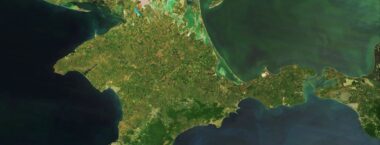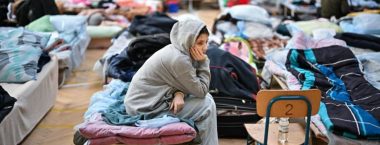
Action Plan for Implementing the Strategy for the Deoccupation and Reintegration of Crimea. What has changed?
On April 4, 2023, the Cabinet of Ministers of Ukraine (CMU) approved Order No. 288-r,...
03 May 2023
We continue our series of short interviews with UHHRU experts on implementation of transitional justice in Ukraine.
Natalya Kozarenko, Deputy Head of the Department of Legal Defense, coordinator of the network of UHHRU legal aid centers.
What does transitional justice offer Ukraine?
When we talk about transitional justice, we often mean that it only concerns the reform of justice in the transition from armed conflict to post-conflict period. But, in my opinion, this issue is much greater and can be applied to many processes taking place in the state during the transition from a totalitarian regime to a democratic one.
The concept of transitional justice originated in the seventies of the previous century. Back then, main principles of transitional justice were formulated – responsibility of the government for crimes committed during military conflicts by its representatives and its obligation to provide restitutions. Another principle I consider very important is the government’s duty to analyze the reasons that had led to the military conflict in order to prevent a repeat of the situation. Fulfillment of these concrete obligations should prevent human rights violations in the future under similar circumstances (e.g. civil conflicts, violent power shifts, terrorism threats, etc.).
The principles of transitional justice will help our society achieve reconciliation, without which building a post-conflict society is impossible.
We must candidly analyze the reasons that made possible both the annexation of Crimea and the conflict in Donbas. Without this, we would be risking a recurrence of the situation.
The tasks at hand for civil society and the government are to identify violations of human rights that occurred in the course of the conflict, to establish their causes and to assess each violation. This will help us establish and develop mechanisms for purging the powers that be of practices of corruption, torture and persecution in the future.
Wars pass, and peace will follow. So we’re going to have to learn to live with the memory of what happened and the understanding that this must not be allowed to happen again.
If Ukrainian politicians accept the principles of transitional justice, how will this affect ordinary citizens?
It is not a matter of “if”, but “when” Ukrainian politicians accept the principles of transitional justice. We need this if we are to survive and save our country. The experience of other countries shows that without implementing transitional justice, we won’t be able to deal with the consequences of such a long-lasting conflict. At the moment, Ukrainian society is full of constant news about the crimes committed in the conflict zone, the frequent deaths and a large number of victims of various actions. There is a very high level of general aggression in Ukrainian society, which makes people perceive everything in black and white. And the latest events in Uzhhorod and Vinnytsia showed that under such conditions, the likelihood of radical sentiments rising is very high.
The experience of other countries shows that without implementing transitional justice, we won’t be able to deal with the consequences of such a long-lasting conflict
But, as practice shows, our leaders are reluctant to take responsibility. Ukraine signed the Rome Statute 17 years ago, but it still hasn’t recognized the jurisdiction of the International Criminal Court (ICC), which deals in The Hague with the gravest crimes against humanity.
The ICC decides on the most serious crimes against humanity, crimes of aggression, genocide and war crimes. The latter should not be confused with military crimes, which have to do with domestic legislation specifically. They are defined in section XIX of the Criminal Code of Ukraine, which deals with unlawful actions by members of the military, namely insubordination, failure to comply with an order, loss of military property, desertion, etc. War crimes under the Rome Statute, however, concern mass and systematic killings, torture, taking of hostages, unlawful deportation, extrajudicial killings, rape, appropriation of property and intentional attacks against civilians and civilian objects that are not military objectives, etc.
There is still no legislation that would guarantee reparations to victims for losses suffered in the course of the anti-terrorist operation. A number of issues that forced people to abandon their homes and made them feel like victims of discrimination remain unaddressed. We have our work cut out for us!
Transitional justice is particularly interesting because its implementation requires mandatory reforms that would prevent a repeat of the conflict in the future. Which reform do you think is the most important?
The two most important aspects for me are the reforms of justice and education.
From the very beginning, the lawyers of UHHRU legal aid centers joined the efforts on providing legal assistance to the victims of the conflict. We started by proving in regional courts people’s rights to compensation – the people who lost their relatives, who were injured, forced to leave their homes and those who lost their property. 4 years into the conflict, we are still continuing this work, because the state still hasn’t developed an effective compensation mechanism.
But even after this issue is resolved, we won’t be able to move on until we change how society perceives the causes and consequences of the conflict. The hybrid war that is now taking place in Ukraine would not have been possible had the population had the skills necessary to resist information attacks. Unfortunately, a large part of the population in Russia, Ukraine and in the European Union aren’t capable of telling distorted messages from the truth and can’t critically evaluate information from various media sources. The lack of media literacy, that is, the knowledge that would allow people to analyze and resist propaganda and lies, is felt throughout all population groups. As columnist of the Financial Times Roula Khalaf writes, “You no longer have to live in a repressed society to be a victim of misinformation. It can intrude into your home and into your smartphone, play with your mind and muddle your reality. It doesn’t always need Machiavellian spooks to make it up or twisted schemes to embed it into the collective consciousness. It can be created by a bored youth in a bar or terrorists on the battlefield”. This is why it is so important to introduce a course on media literacy into learning programs and constantly work with the population – as part of the reform of education.
Implementation of transitional justice in Ukraine envisages pecuniary and non-pecuniary damages for the victims of the conflict. What is UHHRU doing for this?
Since its foundation, UHHRU has been promoting the building of a humane society based on respect for human life, dignity and harmonious relationships between man, state and environment. That’s why, since the conflict in our country started, we have been providing legal support to conflict-affected people. UHHRU legal aid centers working on the basis of our Union’s partner organizations and those that were recently created in regions close to the conflict zone have already provided over 2,760 consultations in 2018. In 2015 we managed to secure the first court decision in Ukraine that awarded damages to a person whose house had been destroyed in the course of the ATO. Unfortunately, this decision has not yet come into force due to the opposition of government bodies. Thus, we are counting on the ruling of the European Court of Human Rights. It currently has more than 300 similar cases pending consideration.
However, legal assistance is not our only line of work. Our activities also include documenting human rights violations that occurred in eastern Ukraine, preparing and publishing analytical materials on the observance of human rights, creating our interactive Memorial Map where information about nearly 10 thousand dead has been collected and visualized, and preparing materials for the International Criminal Court and other international bodies.
If you find an error on our site, please select the incorrect text and press ctrl-enter.

On April 4, 2023, the Cabinet of Ministers of Ukraine (CMU) approved Order No. 288-r,...
03 May 2023

Since the beginning of the full-scale Russian invasion of Ukraine, about 150,000 civilians who fled...
17 October 2022
Within the framework of Crimea Academic Forum – 2022, Taras Shevchenko National University of Kyiv...
15 September 2022
Taras Shevchenko National University of Kyiv and its student community in cooperation with leading Ukrainian...
13 September 2022